Weekly Writing Summary For The Week Ending 02/27/2025
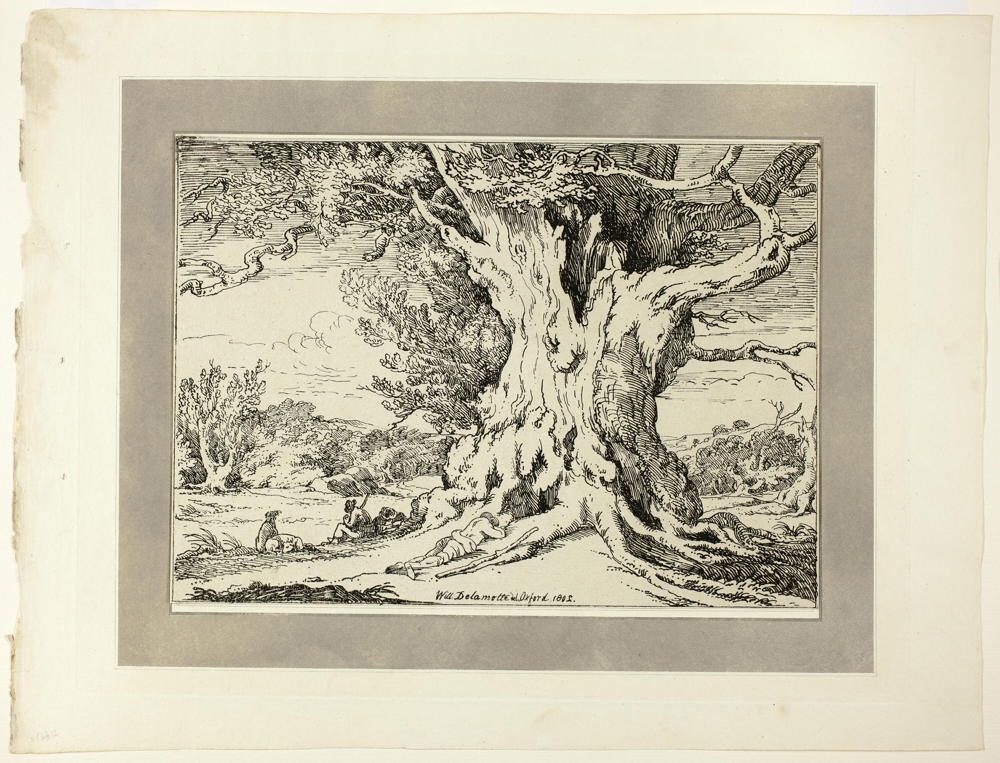
William Delamotte: Resting, Men and Dogs Under a Big Tree,
from the first issue of Specimens of Polyautography 1802, published 1803
An Emboldened Opposition Cheers
How many ways can anybody observe an unsettling situation? Probably an infinite number of ways. I've concluded that their strategy was primarily to scare. My job must then be to refuse to be spooked and to remain self-assured. The howl was never intended to serve as a warning. It was their initial assault, their strategic first step, meant to seem blood-curdling. Those whose blood has curdled produce weaker defenses. Their offense depends upon our weakened defense, so we must muster something other than an, in any way, weakened one. Some insist that we should feel emboldened instead, that we might as well interpret their venom as so misguided as to qualify as self-sabotage. Who's to say it isn't? Who's to say they didn't intend it to be self-undermining? We might be and probably are still witnessing a lemming-like mass extinction event, an attempt by backward-looking Repuglicans to finally do themselves in. They noticed the numbers and have been watching the trends.
No future warmly welcomes them.
Uncle!

Bernard Picart:
Bust of Young Man Resting Chin on Hand (c. 1720)
" … only I hold the cure."
I sleep poorly, if at all, and I can't seem to get hungry. I recognize these symptoms, but only I hold the cure.
Let the record show that after sixty-nine consecutive mornings chronicling the emerging NextWorld, the author croaked out a muffled, "Uncle!"
Imformation


Claes Oldenburg: False Food Selection (1966)
Designed by George Maciunas, Published by Fluxus
"Find friends who will deny your heart's desire in exchange for everlasting innocence."
Subtle differences often go unnoticed. They're part of one of the oldest tricks in the book, employed by charlatans throughout history. Sell somebody the title to a property with a slight misspelling in the description, and you've sold them nothing. Promise with a pinkie pledge while slightly mispronouncing the premise; the other will almost inevitably believe they can trust you. A whole lot of what I might label Imformation exists out there that was only intended to mislead you. The unscrupulous revel in such wordplay. They are playing a game their targets never suspect is even being played. They might discover later, if they ever discover, that they were played in the most profoundly cynical way. Discouragement might be the purpose of this play.
They call them Confidence Men, though that label belies what they should elicit.
Enough

Hercules Segers: Still Life with Books (c. 1618–1622)
Gallery Statement: While Segers’ stack of books looks unassuming enough, it is entirely original, and may even be the earliest still life in European graphic art. While still lifes frequently feature in 17th-century paintings, they are rarely found in black-and-white (in prints).
——
" … they'd never before achieved anything even approaching Enough."
NextWorld seems to contain no Enough. It seems insatiable whether focusing its appetite on the trivial or monumental; it can never get Enough. It wants without regard to availability or means. Using the old addict's excuse, it claims to want what it wants, as if wanting were adequate justification and also as if wanting occurred beyond or before volition. NextWorld seems a victim of its wanting, wanting filling the role of both demon and god. It might be the religion. It is the force behind the non-existent throne. It always was communicable as Hell, perhaps precisely as communicable as Hell, though not everybody seems equally susceptible. I could write an encyclopedia describing the characteristics of those for whom wanting is most disabling, except I wouldn't want to add to the already voluminous literature on the subject. We know who they are and are far too familiar with their dances. The Nazis were famously insatiable. So were Mussolini and his fascists. They each became voracious because they became bottomless. When there's no real answer to the question of how low can you go? a certain kind of gravity seems to take over. One can gorge at every meal, every opportunity, without ever experiencing Enough or even approaching it.
After twenty or thirty years, when vampires seemed to dominate literature and film, we managed to manifest a genuine infestation.
Golf

Jack Gould: Untitled
[woman wearing dice costume playing golf] (c. 1950)
"He's absent without leave or purpose. This might be his greatest gift to us."
Golf represents one very prominent feature of NextWorld. I might be tempted to insist that our Incumbent sought the job for the leisure time it provided, for, despite being one of the Quote, Busiest people in the world, Unquote, he somehow manages to spend three or four days each week at one of his golf courses, playing or playing at golf. I might also be tempted to consider this proclivity evidence of more than an idle interest, perhaps an addiction, for few activities more demean high office than time spent on "the links." The game represents the pinnacle of what economist Thorsten Veblen called Conspicuous Consumption. Veblen lost a series of university appointments because he insisted upon writing unpopular analyses of the world he inhabited. He possessed the temerity to propose that the apparent purpose of success in America was to essentially waste the resulting wealth showing off. Few human activities seem more frivolous than owning clubs dedicated to offering well-heeled opportunities to fritter away hours chasing a small ball around a park. Indeed, the most frivolous possible activities involve throwing away irreplaceable time.
Kurt Vonnegut believed that the true purpose of human existence involves farting around.
Bluster
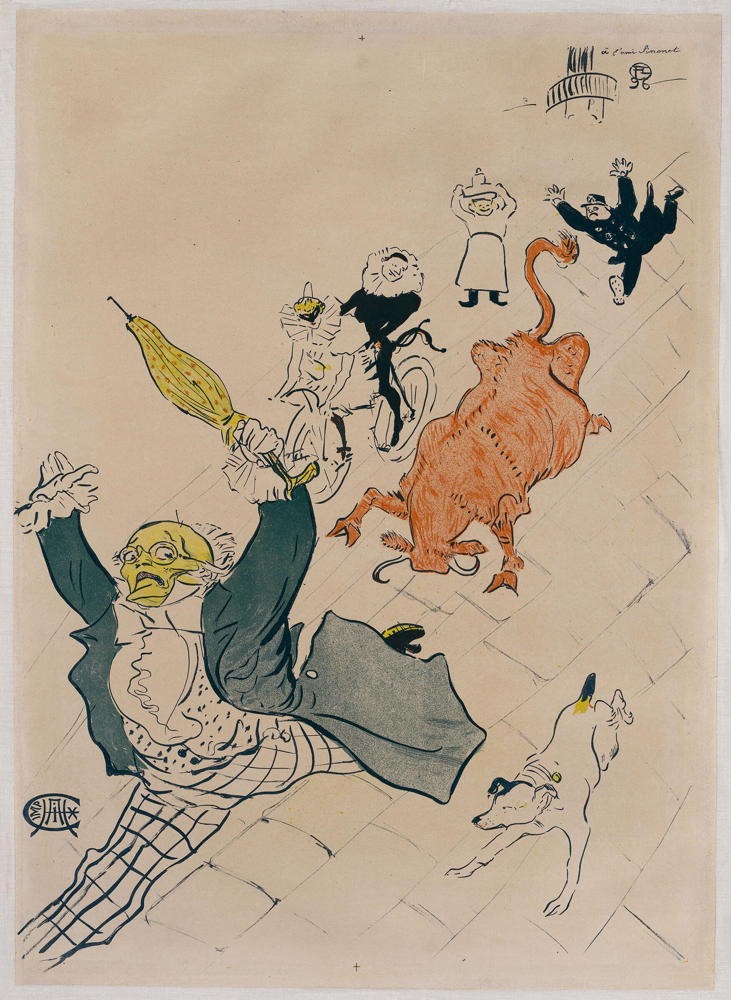
Henri de Toulouse-Lautrec: The Mad Cow (1896)
"It displays just how frail you've become …"
As The Incumbent's cognitive decline continues, he seems to become increasingly impatient and threatening. He seems to enjoy belittling others more than he used to, and he used to revel in the practice. He promises trouble for non-compliers, an act in which defense attorneys delight. He pounds his highchair tray, impatient for compliance. He seems to believe that he's owed deference and respect, even though he's only playing at being president. Maybe he convinces himself, between all the venom and firings, that he's the most powerful man on the planet. He maybe could have been that man had he proved to be man enough to fulfill that role. Instead, he's viewed as the 'enfant terrible' and widely mocked. He performs the role of parody president, attempting to exercise powers he does not possess. He imitates Mussolini, who could always pretend to pitch a fit in a pinch. He lacks that certain gravitas.
Don't get me wrong, he still produces plenty of chaos.
Savings

Unknown artist: Saved (19th century)
"They seem to be aching for a comeuppance from Congress."
Christians associate saving with salvation, the deliverance from harm. Savings might seem even more beneficial than a single act of Saving, though in practice, especially in our new NextWorld context, Savings holds an entirely different connotation. One might innocently presume that as a result of Savings, for instance, that one might necessarily have accumulated a nest egg available to purchase stuff. Not so in NextWorld economics; there, the best one might expect from expansive Savings might be fewer future obligations. In a cash economy, nothing will necessarily accumulate as a result, though lower demand on income might eventually result in some surplus. The purpose of Savings in NextWorld exists only on paper. They're intended to make it appear that we'll have no deficit going forward into future years. For this to be the case, of course, the "Savings" would need to focus on paying down pre-existing Deficits, but that does not seem to be the intention here. No, the purpose seems to be to make the economy appear to be credit-worthy, capable of assuming even more significant deficits to subsidize our poor, suffering one-percenters. The billionaires are wailing and desperately need the public to bail them out again.
In practice, Savings means cutting. In NextWorld terms, it means eliminating even essential services.
Weekly Writing Summary For The Week Ending 02/20/2025
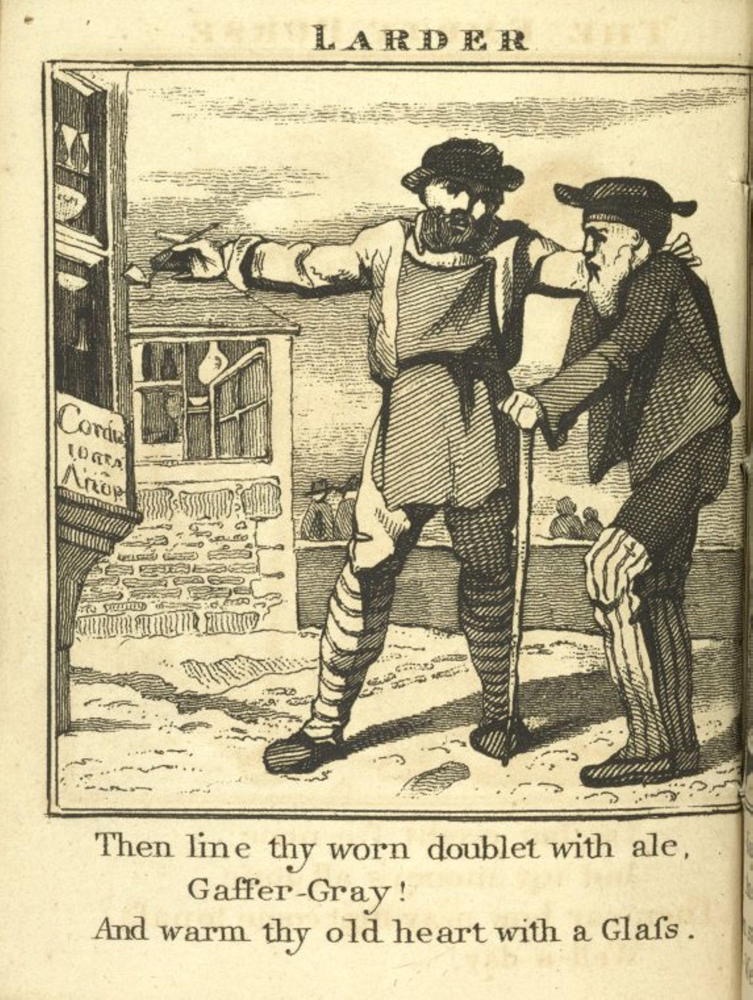
Thomas Holcroft: The Larder (1806)
from Henry Fielding's 1742 novel
The History of the Adventures of Joseph Andrews
and of his Friend Mr. Abraham Adams.
A Difference Nobody Could Miss
Mid-February reliably brings Spring along the forty-seventh parallel, though an arctic intrusion slowed the usual warming this year. The sun crosses some angle where its light reveals a dimension winter withholds. Trees suddenly show height and breadth, and the sky turns the most reassuring shade. A few days spent struggling to shrug off the accumulated snow and, what do you know, it started smelling like Springtime, too. Linda Sue, our housecleaner, chirped that she was so reassured to see the robins flocking in our yard. Flickers descended from up in the mountains to strip our ornamental crabapples bare before they started budding and discarding their fermented fruits. I felt moved to drive my pick-up across the state line to find some fruit tree spray. I'm dedicated to properly pruning the Sacred Apricot and the two newer Maribelle trees this year. I always enter Winter reluctantly, uncertain if I can face up to and survive another isolation. Spring, though, lures me in a month before the calendar finally insists it's here. The calendar and the meteorological always disagree at this time of year, but the angle of the shadows defines a difference that nobody can miss. This was a winter of considerable discontent. May this Spring bring a hasty impeachment. May the inept insurrectionists receive everything they ever feared they'd deserve. I want our country to be of thee and me and you again!
TheWiseKing
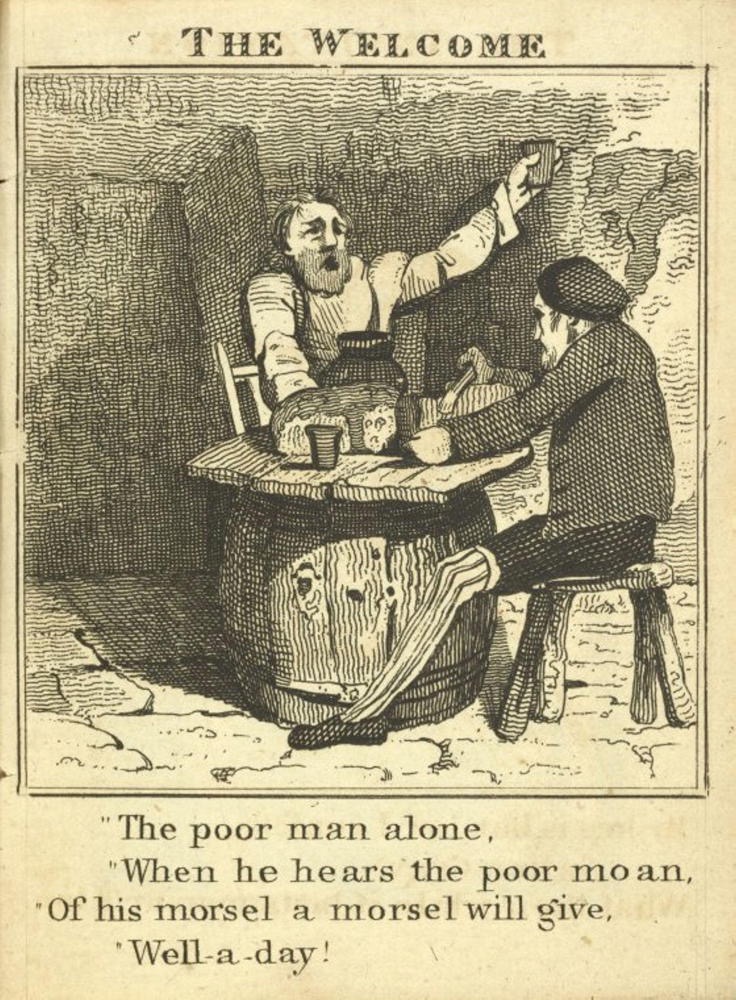
Thomas Holctoft: The Welcome (1806)
from Henry Fielding's 1742 novel
The History of the Adventures of Joseph Andrews
and of his Friend Mr. Abraham Adams.
"He obviously had no viceroy insisting The King Is Wise."
Our incumbent has taken to referring to himself as King. He'd starting making "kingly" pronouncements from his first day in office, though most of these seemed eminently ignorable, just so much bluster. But the delusion seemed to expand as his tenure lengthened, culminating in a self-published magazine cover depicting him in an ermine-trimmed coat and crown. He'd replaced Time at the top of the cover with his name, as if to amplify the depth of his growing delusion. He performs like an eight-year-old might, aching for a sword fight. He looks ridiculous, though he doesn't seem to notice, for few experiences are more entrancing than such imaginings. To elevate oneself more than entrances, it quite literally ennobles. It's all delusion, of course, but the most uplifting sort. The notorious madness of kings originates in just this way. Even those who inherit their crown are subject to this come-down, for the limitations of every charter tend to far outweigh the power they bestow. Real kings learn in their earliest training not how to cope with great authority but how to cope with the more humbling reality of their situation.
They learn that they were born more figurehead than anything.
Innuendo
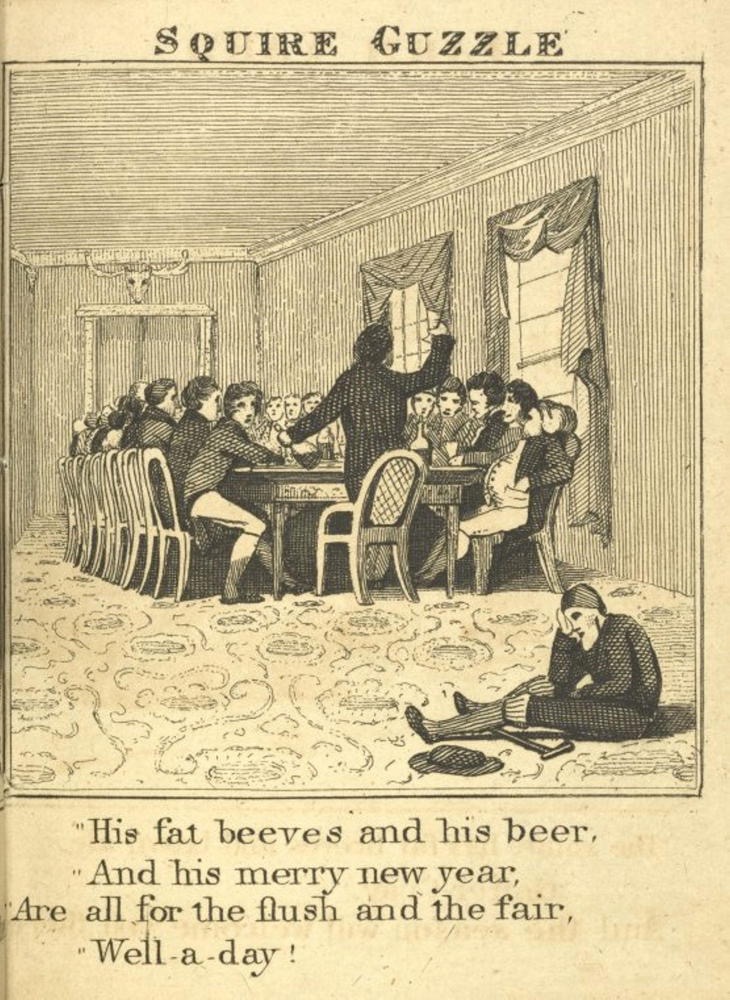
Thomas Holctoft: Squire Guzzle (1806)
from Henry Fielding's 1742 novel
The History of the Adventures of Joseph Andrews
and of his Friend Mr. Abraham Adams.
" … no jury in this universe fails to identify the guilty party."
Being a nation of laws, we highly value evidence. We insist upon more than mere rumor to indict and beyond-doubt evidence to convict. We respect habeas corpus. We prefer to freely cross-examine our witnesses, and we expect them to respond. We have been unaccustomed to moving based solely upon anybody's say-so. NextWorld, though, attempts to run on Innuendo. A mere slur might spur some serious response. Someone without a portfolio might insist that they've cut waste and abuse without producing evidence of either, as if they could replace two hundred and fifty years of disciplined engagement with whispers. Further, nobody seems interested in claiming responsibility. The Who Done It resolves to, at best, vague pronouns. When a federal judge asks who's in charge, the Justice Department defender can't respond, claiming they don't know, so the judge reminds the court of the penalties involved in lying to the court.
The usual sources of vetted information shut down, as if we didn't need to remain well-informed about our government's performance and the spread of the latest infectious diseases.
Dis-
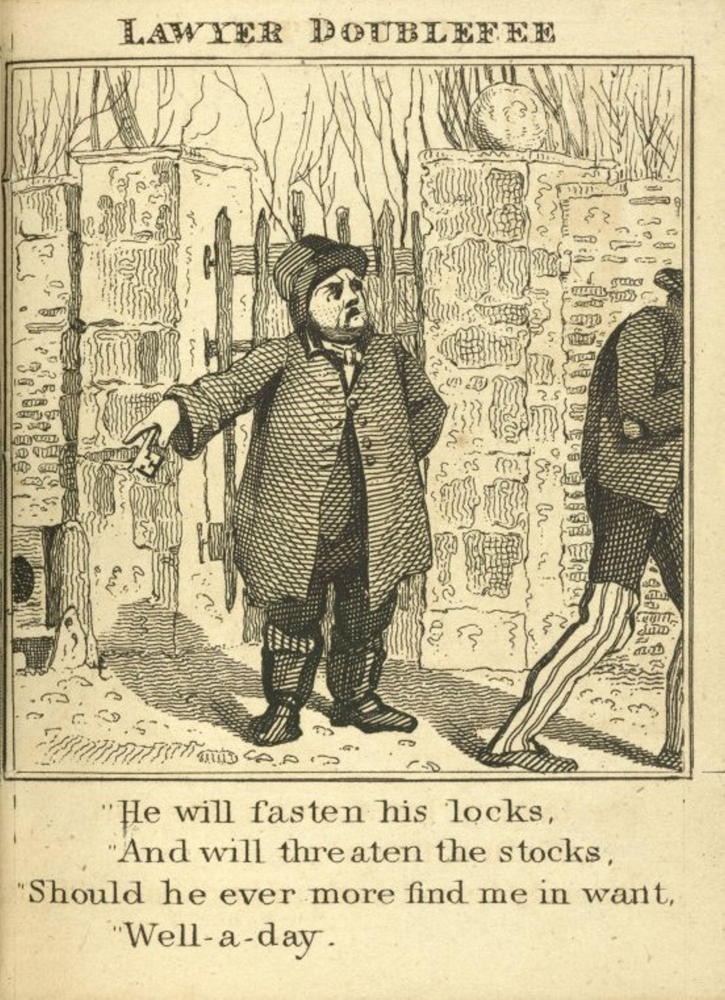
Thomas Holctoft: Lawyer Doublefee (1806)
from Henry Fielding's 1742 novel
The History of the Adventures of Joseph Andrews
and of his Friend Mr. Abraham Adams.
" … They exclusively worship craven images."
NextWorld seems full of imaginary enemies. Former friends and associates apparently turned on us, though I remain unsure just what their infraction was. One morning, I learned that they were also vilified. I wondered if we would have any allies left at the rate we seemed to be chasing them off. Trust collapsed into enmity. Dignity coalesced into infamy. Cooperations evaporated into clouds of obvious Dis-information. Praise became distrust. Admiration turned into public Dis-gust. The incumbent couldn't say enough bad things about anybody. Fascism apparently thrives on a steady diet of imaginary enemies.
But it's not only trading partners who receive these bum's rush characterizations.
MiddleNightMusings
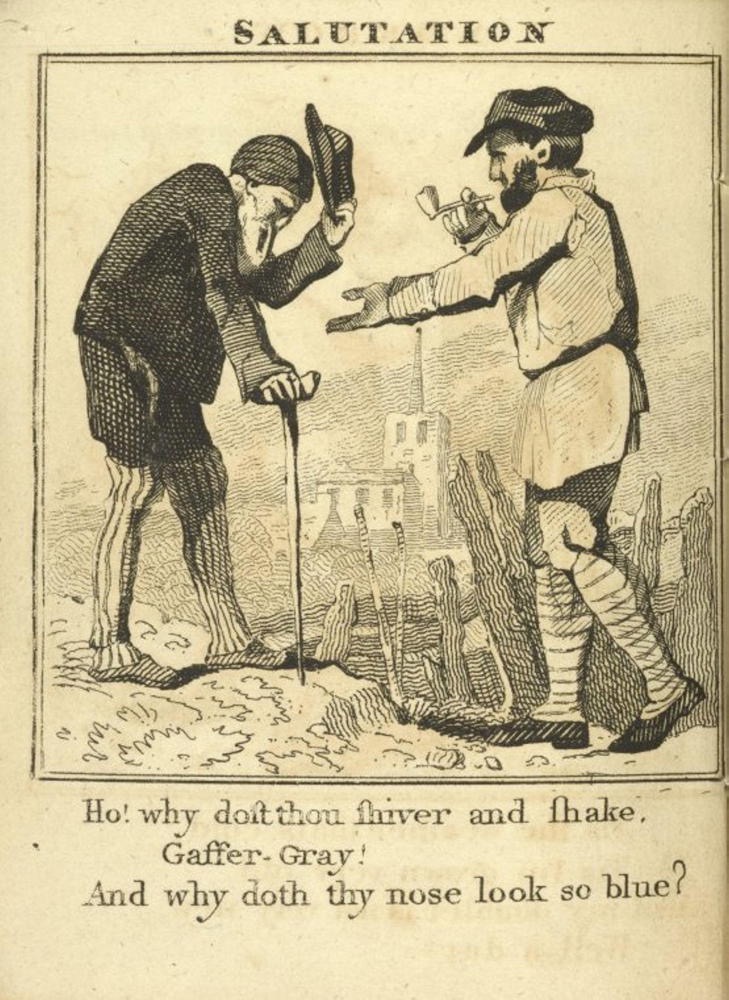
Thomas Holctoft: Salutation (1806)
from Henry Fielding's 1742 novel
The History of the Adventures of Joseph Andrews
and of his Friend Mr. Abraham Adams.
" … it will not be because we knew what to do with it."
My nights have grown longer over the month since NextWorld emerged. Sleep has come in disconnected segments. If I wake a few hours before my alarm rings, I'm apt to opt not to go back to sleep. My monkey mind won't stop grinding, sorting through the disturbing incoming information. Irresolution makes for a disquieting diet.
I sit up with a cat on my lap.
BeLeef
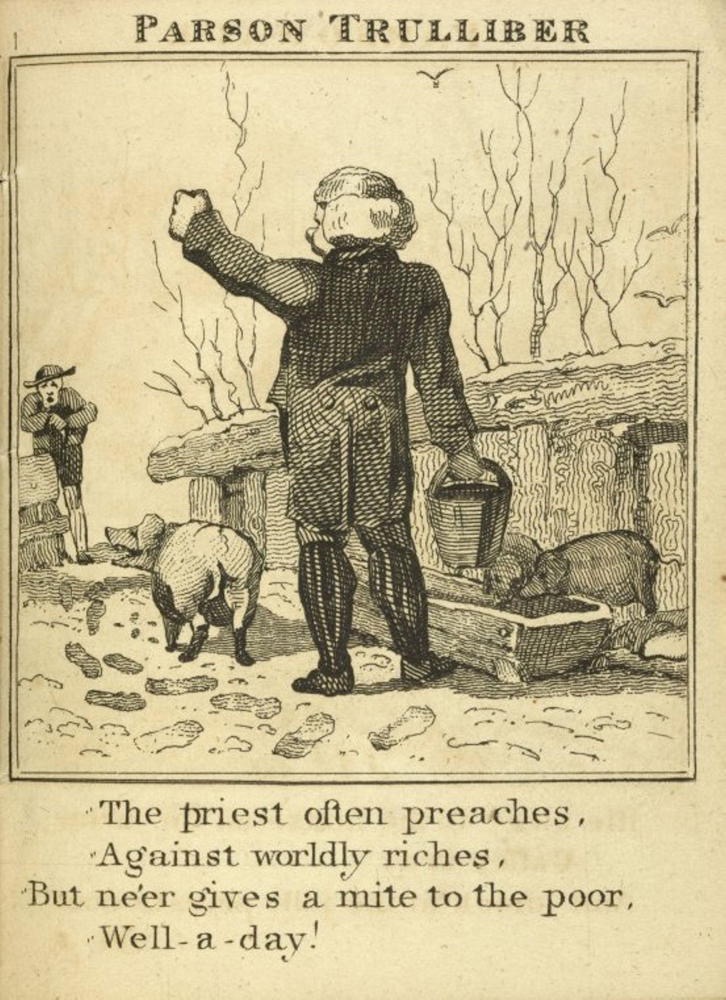
Thomas Holctoft: Parson Trulliber (1806)
from Henry Fielding's 1742 novel
The History of the Adventures of Joseph Andrews
and of his Friend Mr. Abraham Adams.
" … indulging in innocuously guilty pleasures to discover some sense of freedom …"
I suppose I've been steadily accumulating my belief system since just after birth. I don't know this for sure, but I could speculate that my beliefs are merely the sum of my exposures, though that assertion somehow doesn't seem completely genuine. I understand, as nobody else ever could, how I weighted my absorption, favored some inputs over others, and utterly avoided placing myself in the position where some might influence me. I remember back in the eighties when a vendor mentioned how she'd discovered an entertaining new radio commentator. She said he was on for hours daily and couldn't help but listen in as she made her rounds between clients. She played a piece of one of his programs as she drove us to a lunch meeting. I'd never heard of Rush Limbaugh before. I was appalled by his program. I felt as though my vendor had shared porn with me. Her not-even-a-little-bit-guilty indulgence convinced me I should probably not be doing business with her. I quietly withdrew her contracts as they expired and never hired another contractor from her firm.
It seemed to me that she had been poisoned.
Deficits
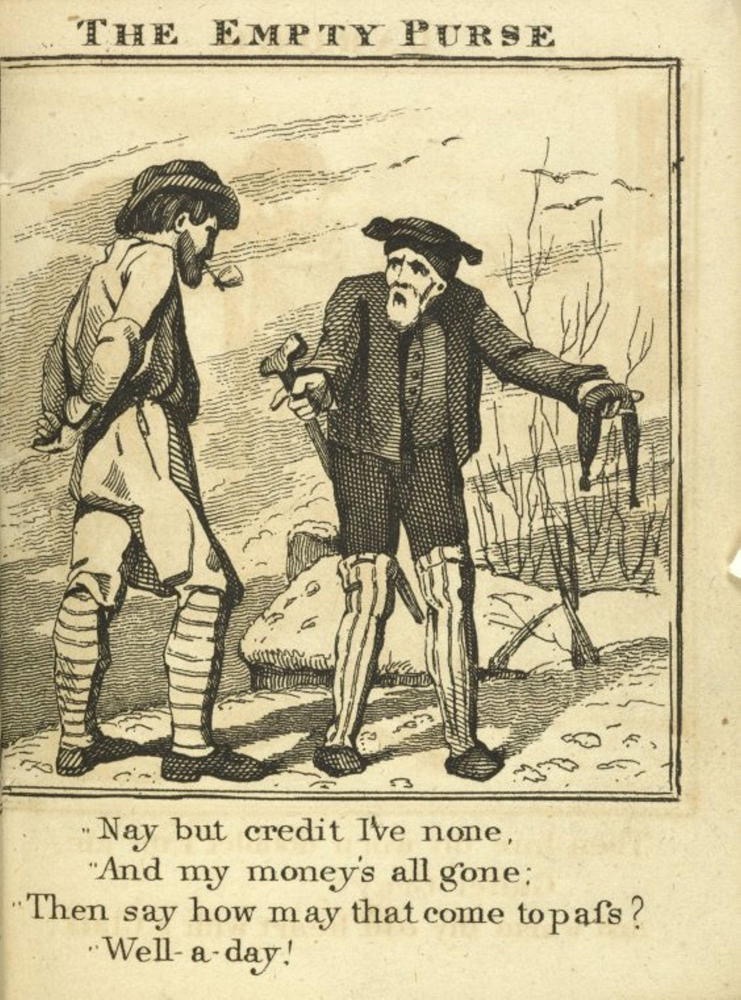
Thomas Holcroft: The empty purse (1806)
"Damn those who never learned how to manage money!"
The key might be to balance. The very wealthy are different from the rest of us because they exclusively live on somebody else's money. It amounts to a wise way to live if you can get away with it. The more complicated way to live must be hand to mouth, or hand to forehead when there's not enough. Those who live by exchanging cash or, heaven forbid, gold, forfeit the possibility of leverage, a magical process by which one can comfortably live beyond one's means. Galbreath said that every generation seems to need to relearn the lessons leverage extends. They usually learn by leveraging too far beyond even their magically-extended means to utterly undermine their dreams. They default on their debt and undermine their credit. This catastrophic event instantly evaporates prosperity, sometimes permanently leaving the debtor in penury.
But I speak here of individuals and corporations, not reserve currency nations.
Weekly Writing Summary For The Week Ending 02/13/2025
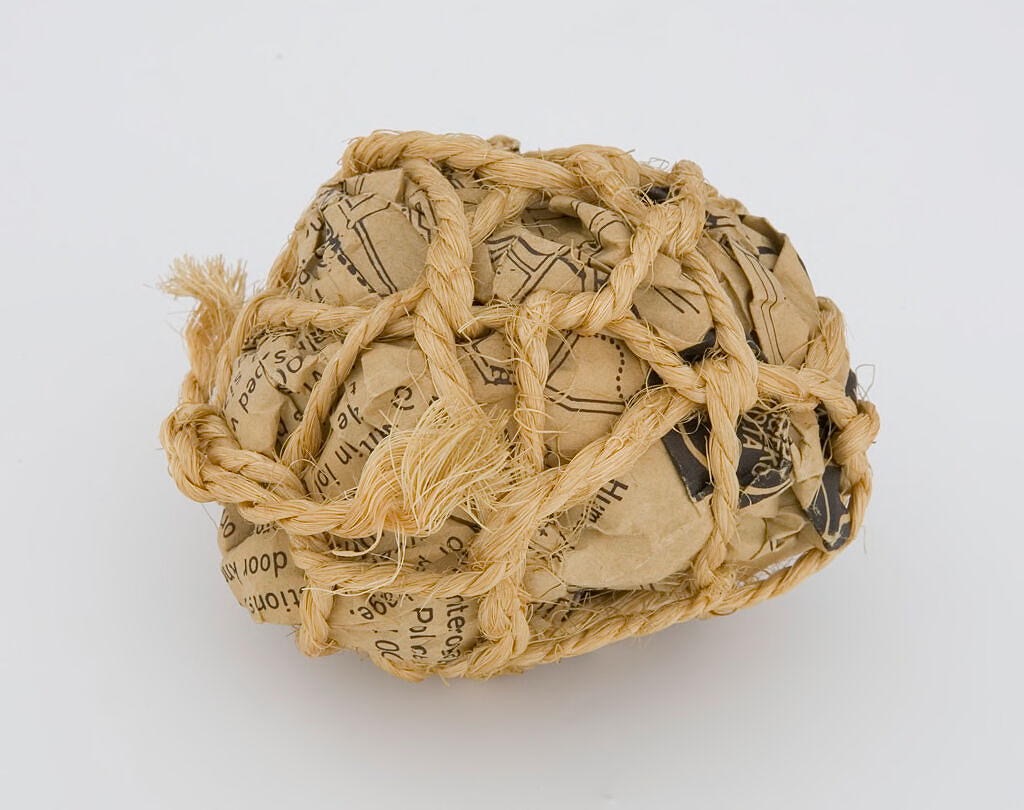
Hi Red Center: Bundle of Events
Designed by George Maciunas
Published by Fluxus
Edited by Shigeko Kubota
(1965)
Tracks They Left Before
This might be the Cabin Fever Edition of my Weekly Writing Summaries, for these stories emerged into a frozen world featuring snow and ice. Most of this winter seemed barely different from Fall, but Arctic air finally descended. It's been a winter wonderland since. I've been exhibiting my snow shoving technique, which I perfected through six Colorado winters. I learned to avoid shoveling there, which requires lifting, sometimes heavy lifting. I employ my snowplow-like snow shover to nudge the stuff out of my way. A snow cover makes The Villa seem cozier, though I've been avoiding building a fire, even though I have plenty of firewood. It's like I'm concerned that I might run out, so I wear my down vest around the house. The cats have been reluctant to go out but still resist using the litter box. They despise walking through snow and carefully reuse tracks they left before.
BigMysteries

Hi Red Center. Canned Mystery (c.1964) Distributed by Fluxus
Inscriptions and Marks
Inscription: bottom of can, in artist's hand: The letter on the bottom of the can - either H or I - is a code referring to the contents. The code can only be broken by opening the can, which then changes the work....
—-
"This somnambulance could be killing us!"
Since this NextWorld formally began on January 20, 2025, mysteries have been proliferating for me. They started in the moments following inaguration when the new incumbent tied into what, just a scant hour before, had been universally-recognized as the world's most successful economy, the envy of every other nation. The acceptance speech, or what passed for one, disparaged what universal concensus had previously praised. We were transformed from a prosperous country into a pauper one necessitating wholesale restructuring. Budget cuts were not just proposed but imposed, even though the incumbent was never given that particular constitutional power. Mass layoffs were implemented, again without the authority to initiate them. I could not imagine how this magic had occurred, from prosperity to the very edge of penury, in minutes. Never in the history of this world had any country fallen so quickly and so far.
Since then, the mysteries have only deepened.
BigPicture
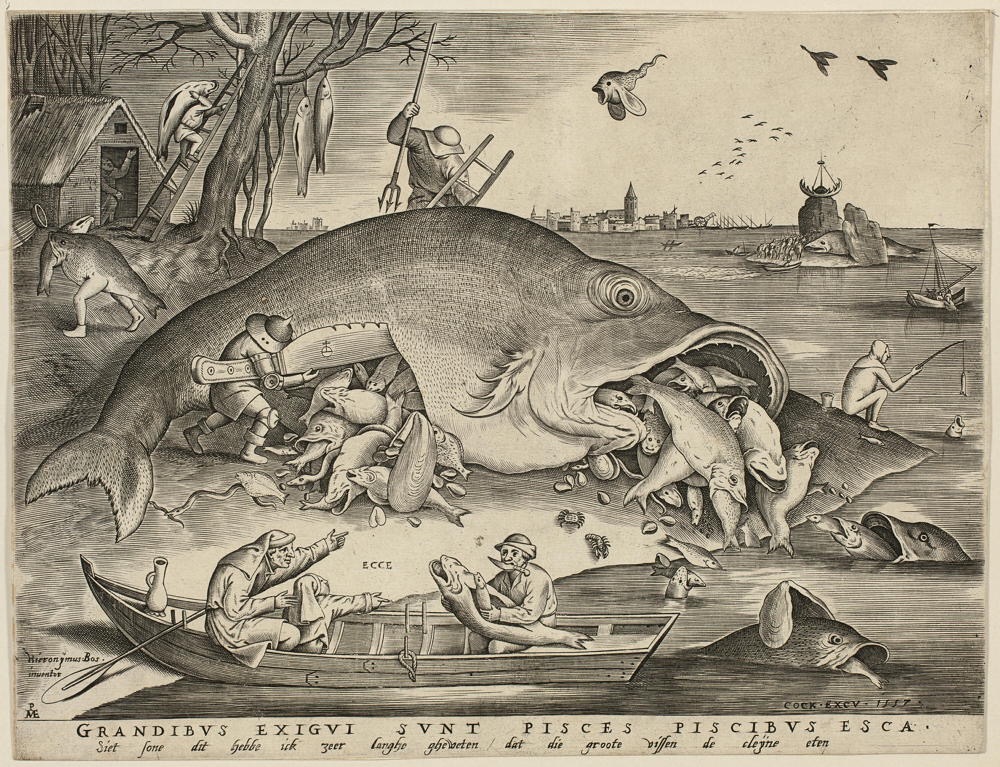
Pieter van der Heyden, after Pieter Bruegel:
Big Fish Eat Little Fish (1557) Published by Hieronymus Cock
ABOUT THIS ARTWORK
This engraving hauntingly illustrates the proverb that the big fish always eats the little fish. Starting with the larger-than-life fish at its center, the image teems with grotesque activity, as bodies spill out of other bodies and hybrid creatures walk and fly about. Pieter Bruegel seems to take a dim view of humanity here, one of disgust at its seemingly endless capacity to cannibalize itself. This is epitomized in the hybrid fish-person at left carrying off its prize, another fish, in its gaping mouth. In the foreground, a man directs a child’s gaze toward the scene, telling him to “behold” (ecce) the proverbial truth on display.
"Those incapable of imagining a coherent BigPicture should never be considered leadership material."
My degree compelled me to enroll in a Systems Thinking class when I went to university. This was considered cutting edge at the time. In it, I was introduced to a few cybernetic precepts and assigned to "design a nuclear-powered electricity generating plant.” I knew nothing about nuclear power or generating electricity, but the instructor showed me how to start with a BigPicture notion of how something like that would have to be configured to work. It would require certain inputs to produce desired outputs, and specific functions would need to occur within the system. The professor demonstrated how to group similar functions into what he referred to as "subsystems." I needed to let go of my natural need to describe details to succeed. I wouldn't need to concern myself with what bolts might hold together a combustion chamber. Those were "mere" details. To arrive at a useful BigPicture, I'd need to presume more than any plant designer needs to define. I was instructed to maintain a useful altitude.
From that perspective, I surprised myself by creating a reasonably practical-seeming high-level portrait of the plant in that exercise.
DeVoting
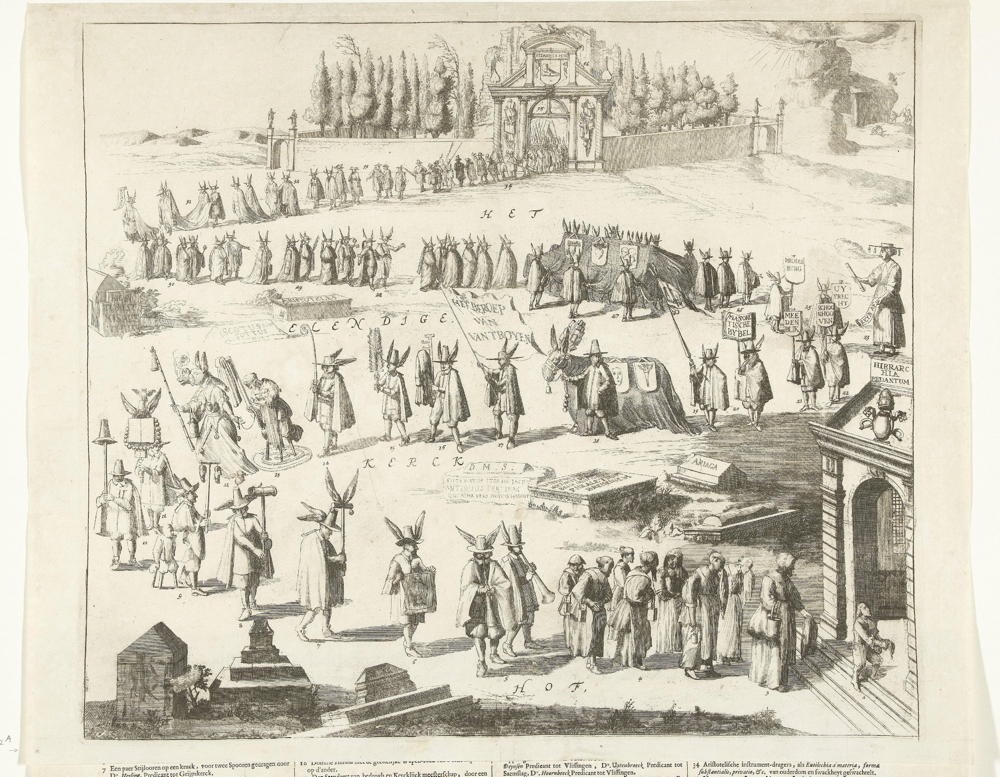
Anonymous: Cartoon of the funeral of Pastor Abraham van de Velde, 1677
Gallery Notes:
Cartoon of the funeral of Reverend Abraham van de Velde, June 14, 1677. A long funeral parade of 4 rows of men with steep ears or donkey ears moves with the corpse of Ds. van der Velde from the House of Unrest over 'the miserable kerkhof', past some tombstones with appropriate inscriptions to the church of the Spiritual Supreme Wore. Some crying sisters lead the procession; in the middle a banner with the inscription 'The profession of Troyen'. The print includes a text sheet with legend. The Footian pastor had previously been banished from Utrecht and played a role in the conflict in Zeeland between the Footians and Coccejans in 1675.
—
"He never understood why he couldn't make the universe dance once he'd gained advantage."
In NextWorld, accolites will vote to enable their leader to choose what to support. That leader will ignore popular opinion and decide to satisfy his desire for vengence against both those he imagined wronged him and innocent, unrelated citizens, for their leader considers himself omnipotent. Their leader intends this novel use of enfrancisement to undermine the future will to vote. As citizens see that their votes influence nothing, they might choose to disenfranchise themselves further. Their indifference could become the most significant influence in future elections, guaranteeing that only the most dishonest candidates succeed. The DeVoted followers might never suspect that they are victims of deliberate DeVoting, a betrayal of everything their country used to say it stood for. By then, the population will have become overwhelmingly cynical, able to explain everything wrong without exhibiting a notion about what might have always been right or how to repair anything broken. It becomes Down With Everything except their disconnected leader. Then it becomes Down With Him, too.
Those most supportive of DeVoting will naturally be the least capable of deciding anything.
ManifestingDestinies

Albert Bierstadt: Rocky Mountains, "Lander's Peak" (1863)
"God the Father manifests as a terrible sword whenever people get involved."
A gleaming emanates from those who believe themselves on a God-given mission. They are not merely existing or just living, but actively Manifesting. Manifesting what? Their Destinies, of course. They might not hold an explicit vision of their end result. Still, they hold an unshakable conviction that they have been especially chosen to deliver something transforming for themselves and the world. These people are crazy, yet if anybody's likely to accomplish something, it seems most likely to be these driven people. They can be self-sacrificial, unconcerned about their well-being. They can also seem completely self-absorbed, uninterested in anything other than their particular obsession. They often exemplify the sin of self-importance, for even given their sometimes considerable self-sacrifices, they always seem to make whatever they're overcoming about them.
These self-selected envoys from God seem odd.
UpRoarious
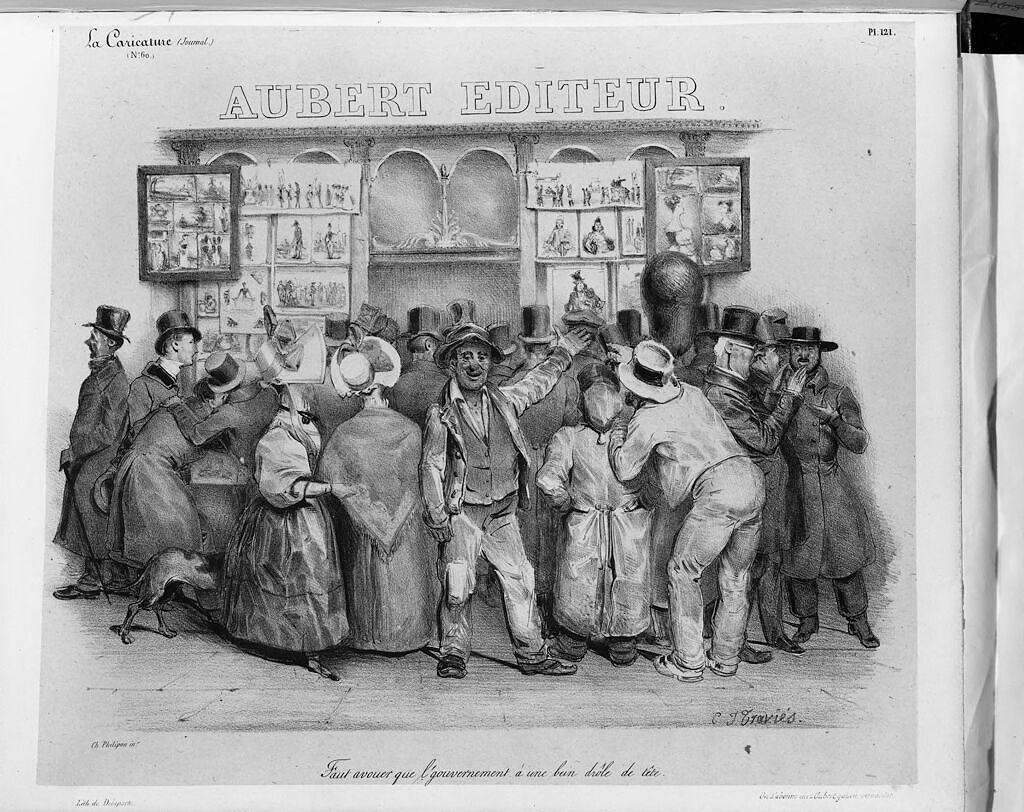
Charles Joseph Traviès de Villers:
Got to admit that the government has a very funny head.
Original Language Title:
Faut avouer que l'gouvernement a une bien drôle de tête.
Series/Book Title: La Caricature III (60) 22 dec 1831, no. 121
(1831)
"You should have cornered the popcorn franchise before you started. That might have rendered you rich and successful."
The MAGA Movement became a movement the same way the more traditional bowel movement emerged, primarily by seeking to create Uproars. They aim to disrupt rather than propose, to break instead of repair. What they intended to be an UpRoar most often becomes UpRoarious, hilarious in its naivety and evident ineptness. They hold principles they carried forward from the darkest Middle Ages. I hope I'm not inadvertently disparaging the more respectable elements of Middle Ages culture to suggest that the MAGA worldview seems tenaciously backward. They tout White Supremacy as if those memes had not been proven self-cancelling since at least the fifties. The eighteen-fifties. They call themselves conservatives, but few understand why they chose to get stuck so far behind modernity. They behave as if everything modern were an abomination, and so they seem to casually discard the accumulated efforts at creating more perfect unions since the creation of this nation. They consequently present a far less than more-perfect platform, but a demonstrably worse one.
They sing the praises of the days when only two genders existed, as if those days had existed.
Sociopathy
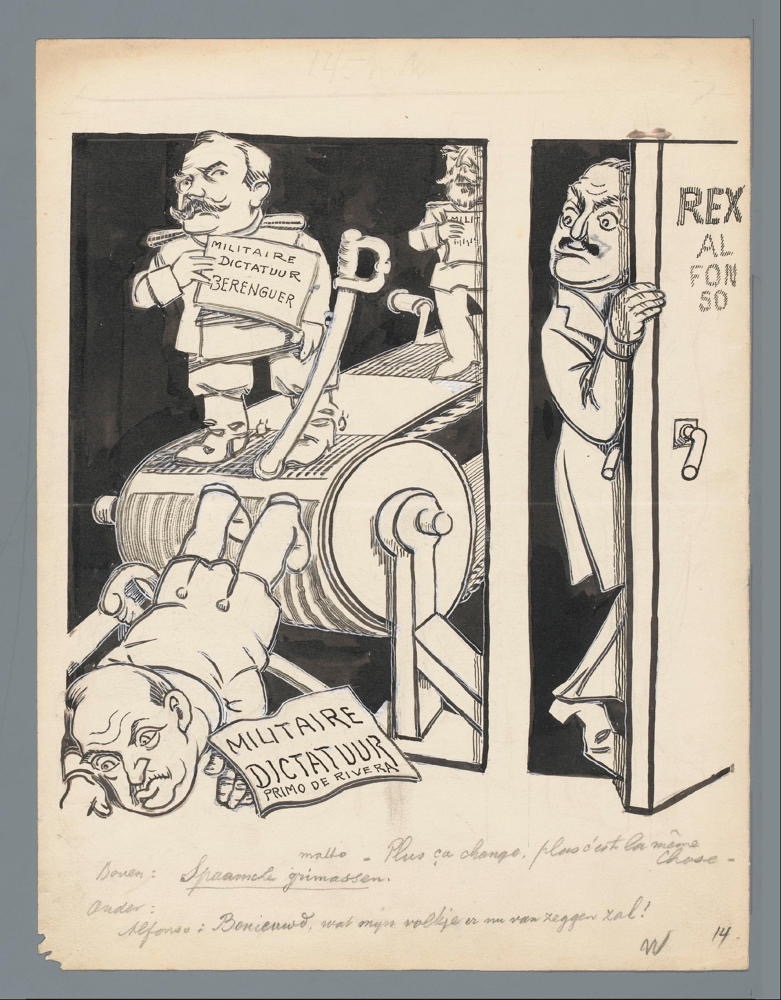
Patricq Kroon: Succession of Spanish dictatorships (1930)
Gallery Notes:
The Spanish King Alfonso XIII watches as the dictator Miguel Primo de Rivera falls off the assembly line and is succeeded (in 1930) by the next dictator Dámaso Berenguer. Design for a political cartoon.
"They seem offensively self-centered."
Certain characteristics seem common to the MAGA Class. The traits seem strangely consistent, as if each proponent had been schooled in the same comportment, for each exhibits similar patterns. A MAGA might be reasonably expected to profess Christianity, though not any innocuous odd mainstream kind. They tend to "be" evangelical, which means they carry an explicit obligation to try to convert everyone else to their belief system. This notion must require enormous ego strength to fuel what must eventually seem like serial failures. However, it appears that MAGAs also tend to stay within a narrow social circle where the bulk of people have already "accepted Jesus Christ as their personal Lord and Savior," whatever that might mean. They tend to carry the certainty of The Saved. Whatever sins might have spotted their past, they seem to feel washed clean from them now. They speak and act with unusual impunity.
They might believe they are not beholden to obey specific laws and rules.
Weekly Writing Summary For The Week Ending 02/06/2025
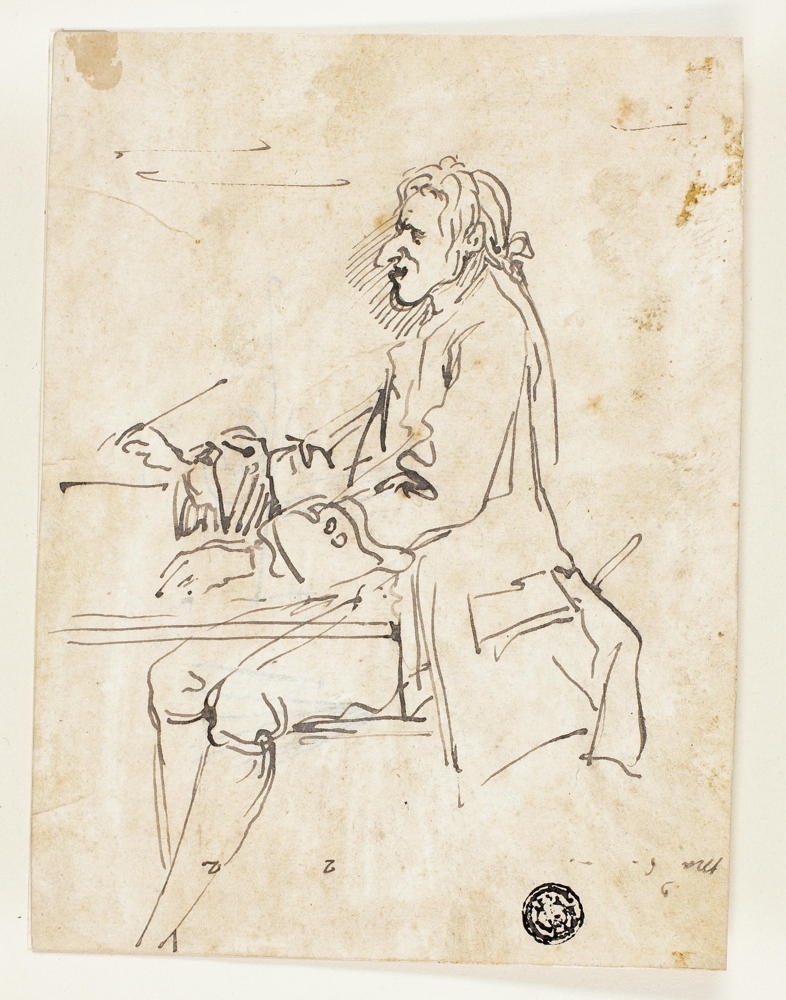
Carlo Marchionni: Caricature of Man Writing
(18th Century)
Smothered In Fresh Bullshit
I don't think of myself as so much a slave to truth but more of its servant. Truths have generally served me well, once I recovered from my typical adolescent embarrassment over who I was. As I discovered, developed, and learned to appreciate my gifts, I could increasingly feature them in my stories rather than presenting ginned-up exemplars. I found more leverage telling my truths than by fabricating lies. I noticed then that I attracted different sorts of friends than others discovered around them. They weren't selling anything. They seemed accepting. They lived above board. They kept their share of secrets but for privacy instead of piracy. It surprises me how central lies seem to be in this NextWorld presidency. I doubt anybody can keep up with the lies spewing out of the White House. Small and huge, covering every possible topic.
I doubt anyone can discriminate between truth and lies from there, other than to conclude that there's no truth in there. I wonder about the self-esteem required to so thoroughly surround oneself with fabrications. I sense a slimy sort of soul poking out sticks from within a cage. He must be terrified of the truth. I'd never before considered how fungible lies can be. They might be easier to defend than even the most obvious truth, for they do not depend upon anything but imagination to justify them. They seem relatively impervious to criticism. A simple denial surrounded by a remarkably few fresh untruths and even the most dedicated critic finds themself smothered in fresh bullshit.
The American Way
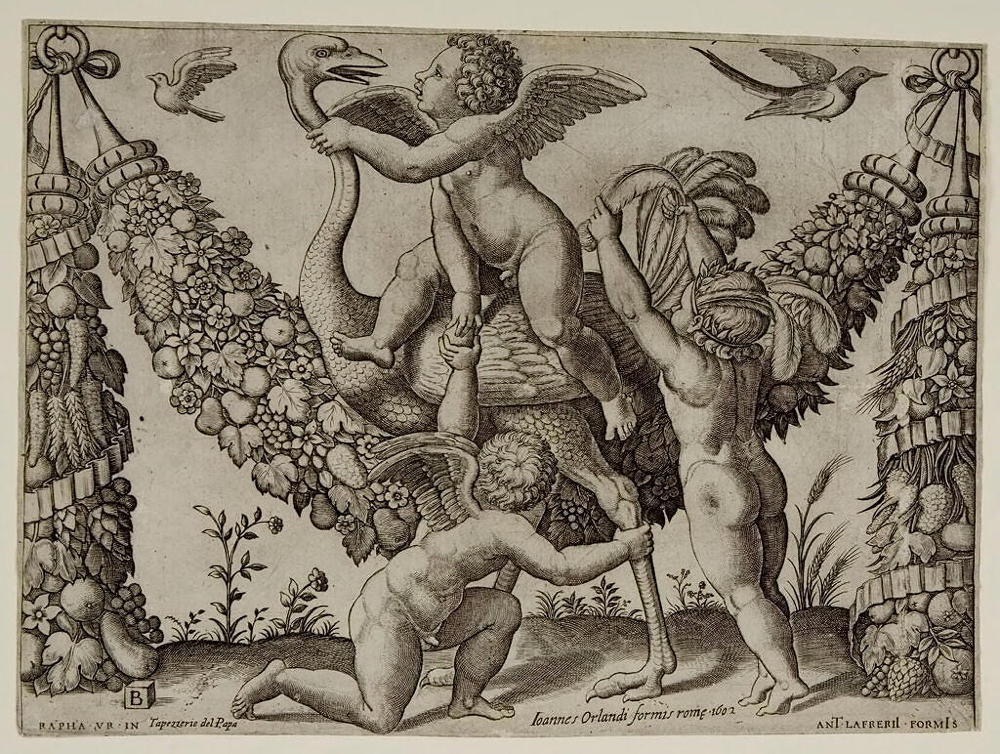
Master of the Die, After Raphael:
Three Cupids Playing With An Ostrich (16th century)
"The stence of competing righteousnesses clogged the nostrils."
The American Way must be one phenomenon that can only be recognized when seen because it sure seems to defy description. I could haul out the fife and drum and affect a limping march while performing an old English drinking song about a gay blade. Very few would take offense at my performance because we were seemingly all raised with that representation, and we immediately recognize it as really about us. Call us, "Macaroni!" We expropriated much of who we are and what we've become from close associations with people from other traditions, other nations. If we aren't a melting pot, we're a slag heap, incompletely assimilated bits and pieces coexisting more or less. Our unity seems to come solely from our inherent diversity: out of many, one. This tenuous identity has been a defining trait through decades of misadventures.
This identity has been particularly annoying to efficiency experts, and few professions have ever been more American than efficiency engineering.
The American Scream

Frederic Edwin Church: Our Banner in the Sky (1861)
Gallery Text:
"Within this vibrant scene of atmospheric flux, an opening within a roiling cloud layer reveals stars against a blue firmament. The barren tree in the foreground doubles as a pole for this celestial apparition of the “broad stripes and bright stars” of the U.S. flag. Following the rapid succession of political provocations that led to Confederate forces firing on Fort Sumter, Church channeled his belief in the divine righteousness of the Union cause into this patriotic visual spectacle.
As the sectarian conflict stretched from weeks into months, the oil sketch, with its allegorical river valley resembling the Catskills and the Hudson River, was translated into a popular chromolithograph. The New York branch of Goupil & Cie issued the prints as a subscription fundraiser to support the families of Union soldiers. This is one of the few lithographs from the series that Church painted by hand."
" … trying to rebuild a society similar to the one that existed on the last day of Joe Biden's administration."
It seems in the nature of countries that they do something monumentally stupid every once in a while. Some of them might have seemed like a good idea to a few. Still, ultimately, nobody holds that opinion because these events introduce an extended recovery period during which the country gets to reconsider every belief it ever held. Brexit was such an event for Britain. The firing on Fort Sumpter serves as an example of us doing stupid to ourselves. We still struggle with integrating the ramifications of that single short-sighted act.
However wise or wonderful, every country takes its turn.
The American Dream
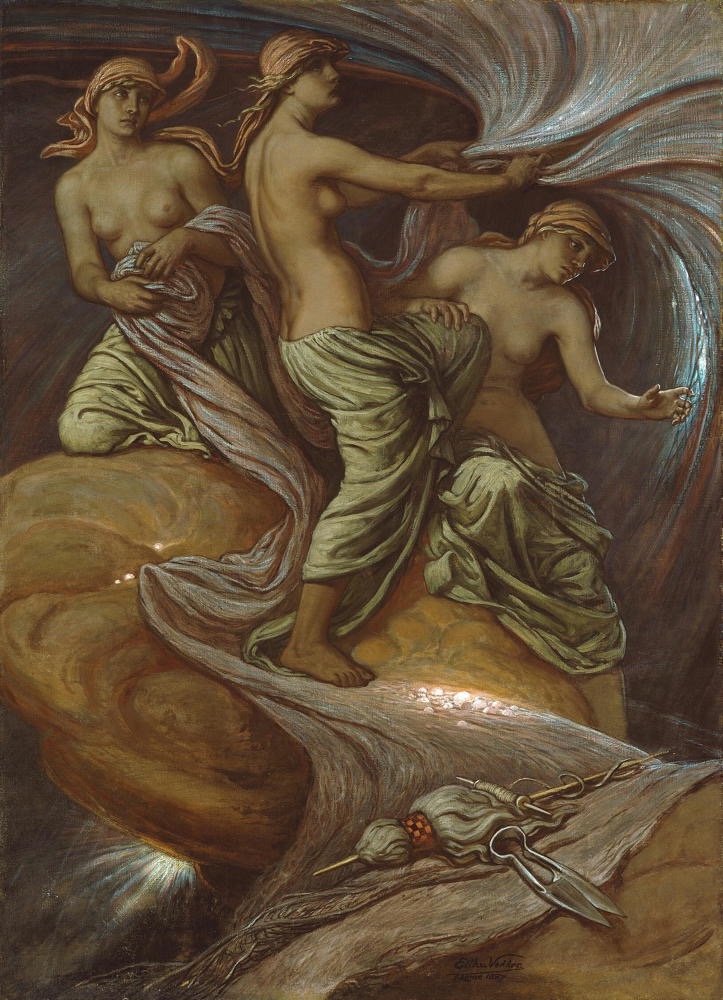
Elihu Vedder: The Fates Gathering in the Stars (1887)
Gallery Notes:
Elihu Vedder depicted the three Fates of Greek mythology working the thread of life: Clotho spins the thread, Lachesis fixes its length, and Atropos cuts it at the appointed time of death. Their symbolic tools—spindle, distaff, and shears—rest in the foreground, emphasizing the Fates’ decisive role in matters of life and death. Vedder adapted this painting from an illustration he had designed for an 1884 publication by Edward FitzGerald—a translation of the work of 11th-century poet Omar Khayyám, The Rubáiyát. Vedder was attracted to mysterious, visionary subject matter. Here, he explored metaphysical questions of life, death, and afterlife, subjects at the core of Khayyám’s poetry.
"We will never feel completely satisfied with this perfection."
People have been trying to improve our Constitution since the day it was ratified. It was born broken, the product of debate and compromise, not even aspiring to perfection. It was genius, though, in perhaps only one aspect. It was deliberately drafted to be amendable. It was created to be changed. Change, therefore, would not be evidence of something having been broken. Change would help realize aspiration, which might have been the whole purpose of our Constitution in the first place. It was an aspirational document rather than the final word. A beginning, never the end. It might have been that the Founders envisioned an ending to their story. If so, history has so far foiled that intention. Between those firmly believing that our Constitution is the word of God and those who perhaps equally firmly believe it was the product of typically imperfect people lies the playing field upon which we create our history's first drafts. Our future might draw a few conclusions about it, but we certainly can't.
The resulting government mirrors the Constitution in one crucial aspect.
The Biggest Lie
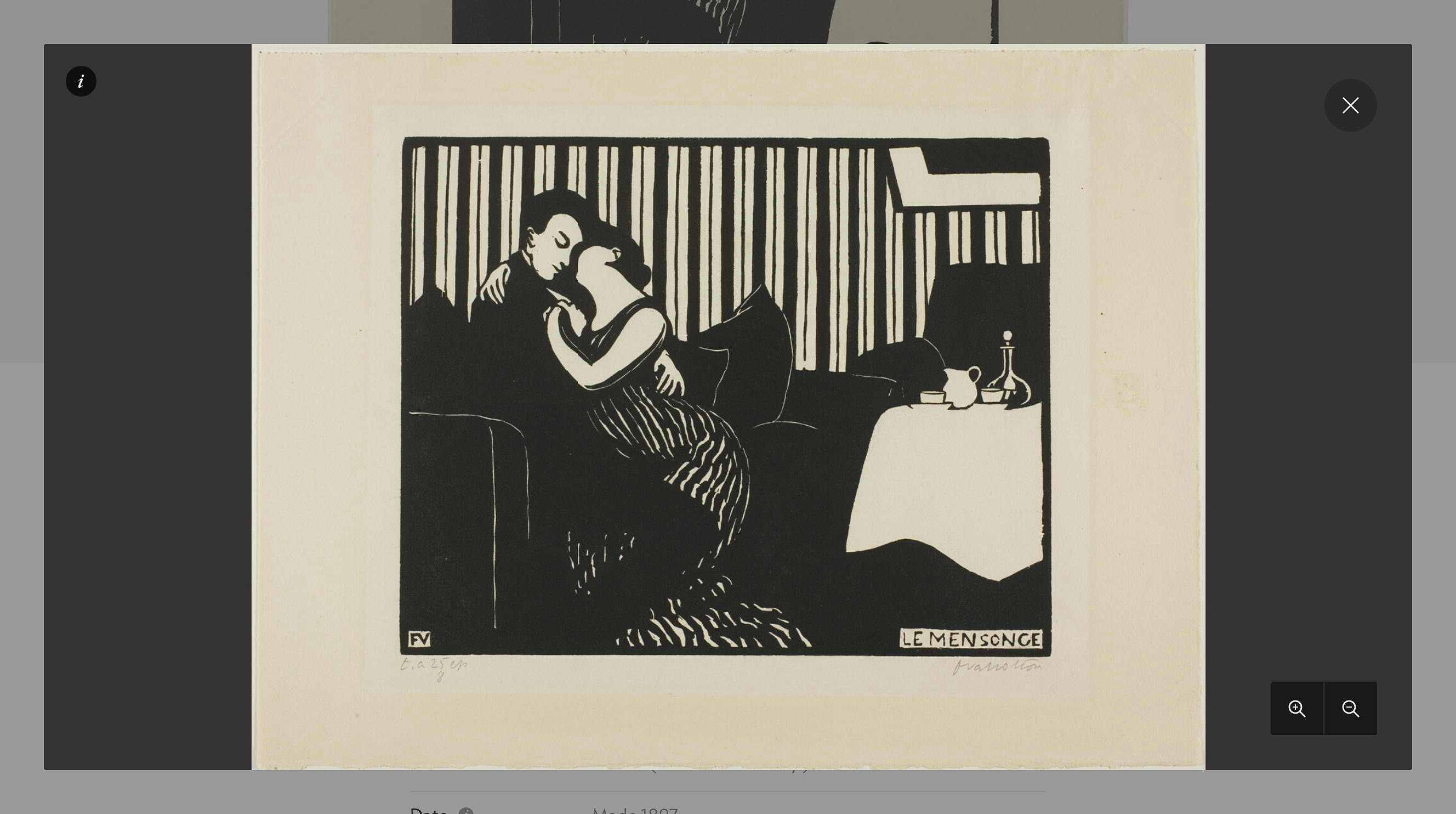
Félix Edouard Vallotton: The Lie, plate one from Intimacies (1897)
“Those who had most loudly insisted that faceless bureaucrats had compromised our country became the faceless bureaucrats about who they so publicly complained.”
The Biggest Lie in American politics insisted that our country has been stolen by faceless bureaucrats and, in its later configurations, by an unidentified "Deep State." It insisted that our government no longer belonged to us because its laws seemed to hurt rather than reward us. Of special focus, income taxes were characterized as theft and government services as "inefficient," another undefined term intended to mean "wasteful." Lost in these arguments was any sense of how wealthy our country was, perhaps because few could even distantly imagine how wealthy that might have actually been. It was easier for most of us to imagine our government's finances as roughly similar to our household, where perennial income shortfalls continually threatened solvency when we were collectively wealthy beyond almost anyone's wildest imagination. We were in the postwar years, rich enough to personally bankroll the economies of Britain, Europe, and Japan. Our debt became the free world's burgeoning prosperity, and we more than made back every penny we expended, whether in direct aid or financing.
We were so wealthy during the immediate postwar period that our government spent the equivalent of the value of every bit of privately held property on defenses we would never use, and this while steadily increasing the support supplied to disadvantaged citizens.
The CEO Disease
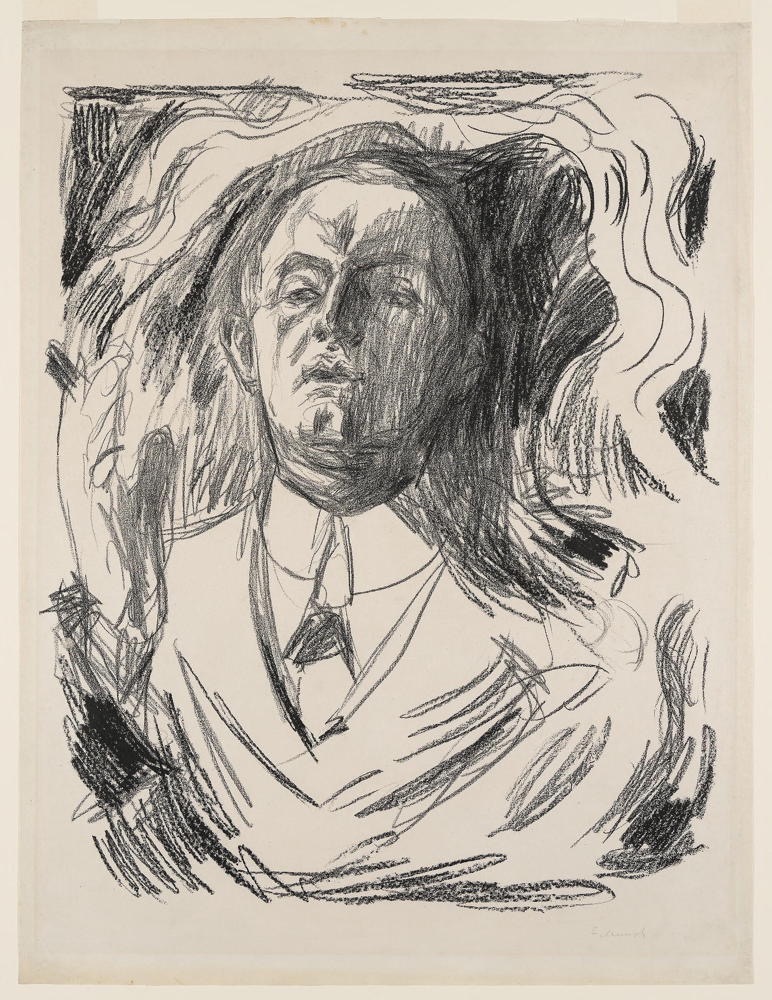
Edvard Munch: Self-Portrait with Cigar
Original Language Title: Selvportrett med sigar
(1908-1909)
" … nobody's pissed off Old Mary enough. Yet."
Thirty-three years ago this month, I went to work as a very junior consultant with a boutique Silicon Valley consulting firm. Our clients included most of the hot high-tech companies of the time, with Apple topping the long list. I'd gone from a middle management position in a regional mutual life insurance company to being an advisor to some of the best and brightest minds in the acknowledged finest high-tech companies. I found those minds to be largely unexceptional, for they seemed to be prey to the self-same delusions and misconceptions within which I'd caught myself dabbling. Something extraordinary happens whenever we engage in project work together. I had been working on an understanding of this mysterious something. That was a big reason I'd agreed to take that job, even though it gave me a pay cut and demanded that I travel four or five days each week. I sensed a considerable upside. If I could work with these great companies, perhaps I could learn their secret. Maybe I could even finally become proficient in the project work I'd failed to master over the prior decade.
Several of our clients were led by what I understood to be true industry icons.
The Fourth Stage of Cruelty: Reward
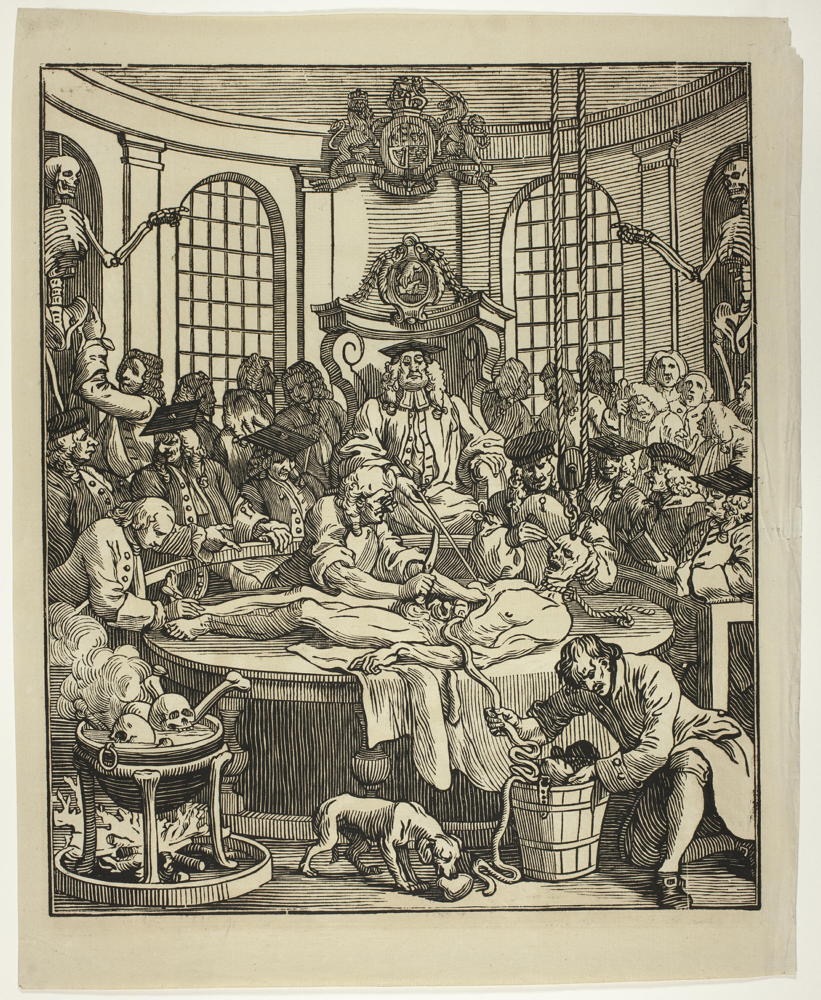
John Bell, after William Hogarth: The Reward of Cruelty (1750)
Series/Book Title: The Four Stages of Cruelty (1751)
"We will be as grateful then as we were rightfully fearful before, Gods willing."
"The Final Stage of Cruelty, following the casually random, wide-ranging cruelties practiced through Stage Three, occurs posthumously via some form of autopsy. The corpus will be literally cut open as if to find the source of the evil he incarnated. The coroner will find nothing to explain the behavior. No brain tumor or pituitary problem. He will ultimately be judged as apparently normal except for those disturbing behaviors he seemed compelled to inflict. He was not, as many speculated through his life, particularly sick. Anyone with a dick even that size might have been tempted to act out, but he went beyond mere over-compensating behavior. His performance eclipsed acting. He will have died at his own hand. Not necessarily suicidally, but as a direct result of casually inflicting some genuine cruelty. Eventually, even the universe loses her patience and takes out a particularly errant child. This one never matured into an actual adult. He died as he existed, at the emotional age of about eight. May we finally rest in peace without him." NextWorld, The Third Stage of Cruelty: Perfection
I began this final installment of this series within my Nextworld Series with the final paragraph from the next-to-last installment, for I presaged this ending there.


